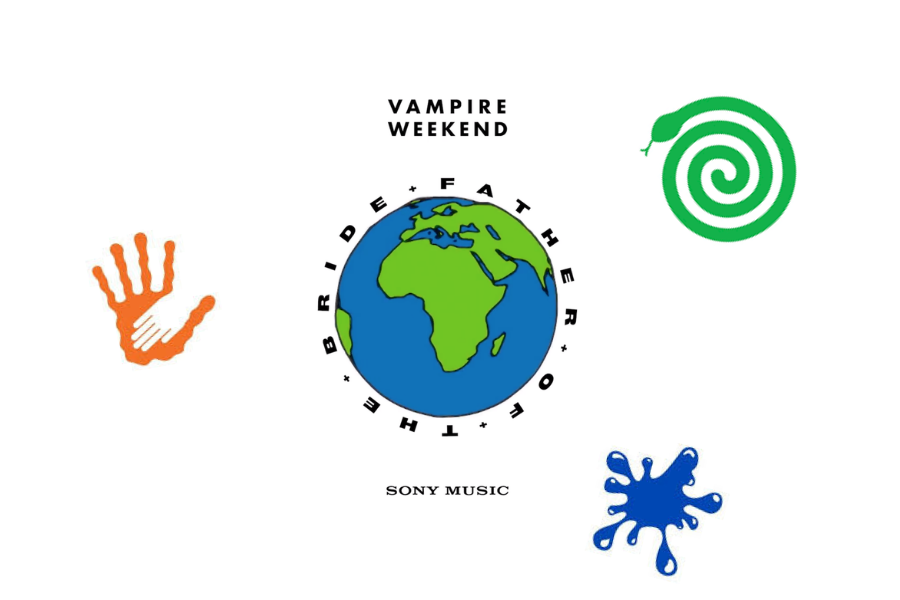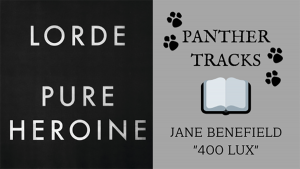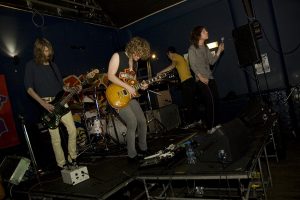‘Father of the Bride’ weds old love with modern style
Created by Ian Fertig (using materials from Sony Music)
After a long break, indie rock band Vampire Weekend released their newest and lengthiest album, “Father of the Bride,” last week. This massive work was a beautiful step forward for the band, marking the start of a new period in their career.
May 12, 2019
An album six years in the making. A band taking a confident step forward. The “Father” album of the soft rock age is here.
Vampire Weekend, the genre-defining indie rock group known for their work in the early 2010s, seemingly vanished from the public eye after the release of “Modern Vampires of the City” in 2013.
During their brief six years releasing music from 2007 to 2013, they created numerous essential tracks to the indie rock scene. “A-Punk,” “Unbelievers,” and “Diane Young” stand out as three of their most memorable works. For the last six years, the band has rested on their laurels after a phenomenal run creating cool and confident music.
Until now. After a hiatus that lasted nearly as long as their time in the spotlight, Vampire Weekend is here with their greatest and tamest album yet. “Father of the Bride” is a collection of eighteen new songs from a band too long off the radar.
Vampire Weekend’s older works thrived in the late 2000s era of fun and catchy genre-blends that sought to fill the cultural void left by the truly alternative rock of the late ’90s. Their lyrics were reflective on the nightmare of modern consumerist and omnivoric culture, but the rhythms and beats the band fashioned with their musical talent were quite fun and upbeat by comparison.
As their beautiful sub-genre of music evolved and the majority of the world shifted their focus to stadium rap and pop music — because the masses want a good party more than anything — Vampire Weekend was left behind, with their old tracks a graceful reminder of an older era.
After years of resting, reflecting, and working, the band is back, with an album that is profoundly different from the previous three. The music is still created by the same talented team (vocalist Ezra Koenig, drummer Chris Tomson, bassist Chris Baio, and guitarist Rostam Batmanglij, who despite taking a break from the group collaborated with the guys on this newest album). But “Father of the Bride” is separated from its sister albums by something more than six years of time.
For starters, the cover art of the previous albums were glamorous photographs so beautiful they could drive would-be listeners to buy the album on vinyl just to look at them in large print. The three two-track releases that preceded “Father of the Bride” and the art on “Father of the Bride” itself is simplistic and cartoonish. Although the simplicity is artistic in its own right, it’s almost childish when compared to the cityscape photograph that embodies “Modern Vampires of the City.” This cover was an intentional choice, one that sets the album apart without coming across as too strange.
The style of the music is the chief difference. “Father of the Bride” is a much slower album. The music is a soft rock style that comfortably welcomes Vampire Weekend fans back after the long time apart. The guitar riffs and drum lines are better in quality but conform less to the loud, proud, and repetitive formula. Classic instrumental music pairs with digital effects and samples to further set this new album apart from the old. “Father of the Bride” isn’t cool and pop-y, it’s a smooth and stylish album that has more to say through quiet than through noise.
“Father of the Bride” features appearances from artists Steve Lacy and Danielle Haim. Lacy’s tracks are meditative and funky songs, and Haim joins in for a melodic duet in “Married in a Gold Rush,” one of the best songs on the album.
The thematic undercurrents of the album revolve around promises, commitments, and human relationships. The modern fear of the future, and the general hopelessness of facing the world’s problems alone, make an appearance as well. There’s a healthy dose of intimacy and unity throughout the album. All-in-all, each piece is a beautiful component of the main picture the album paints of today’s world.
This album is a welcome into summer, with the perfect melodic symphonies that invoke feelings of the warm sun and time spent with loved ones. It’s just what Vampire Weekend fans need, and on a deeper level what music lovers all need — a fresh start that promises great things in the future.









